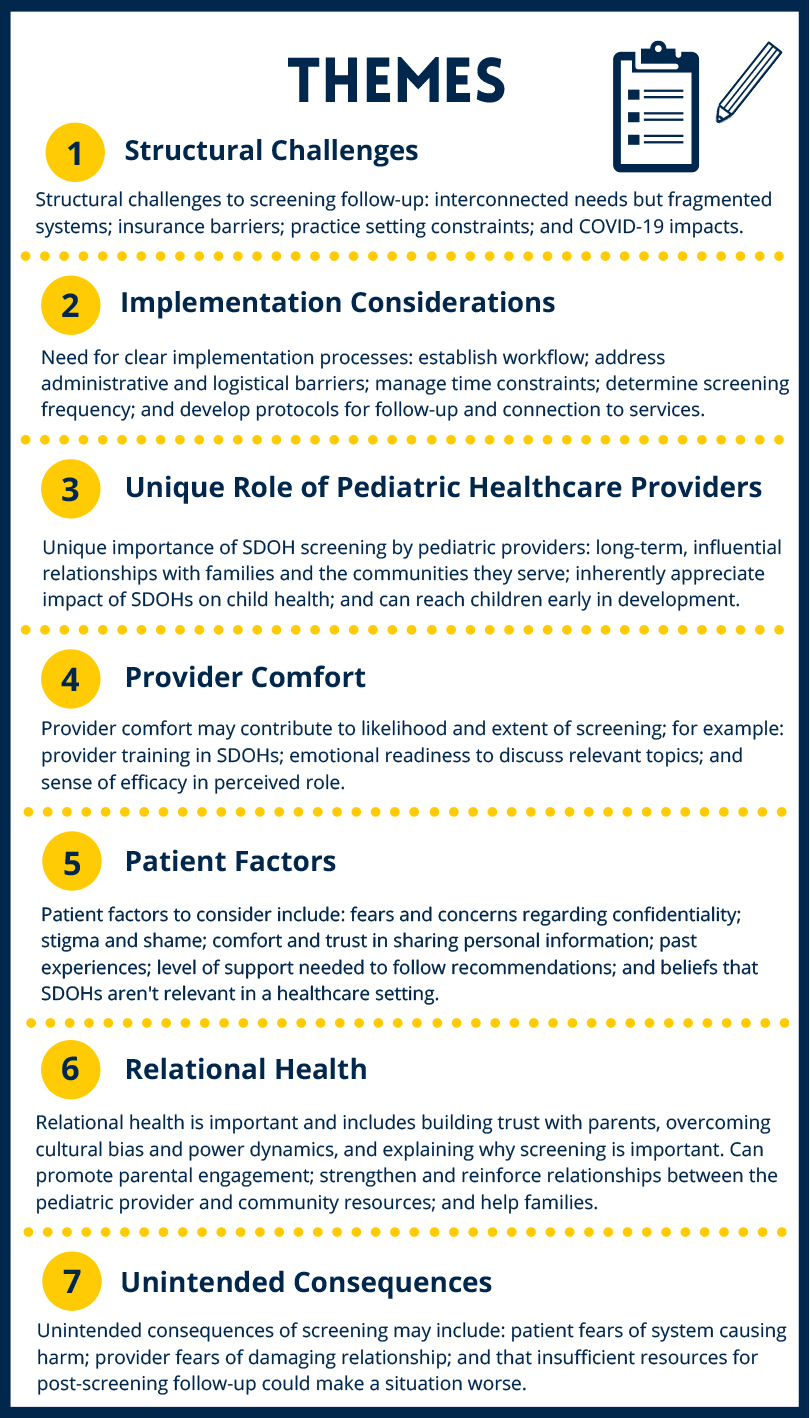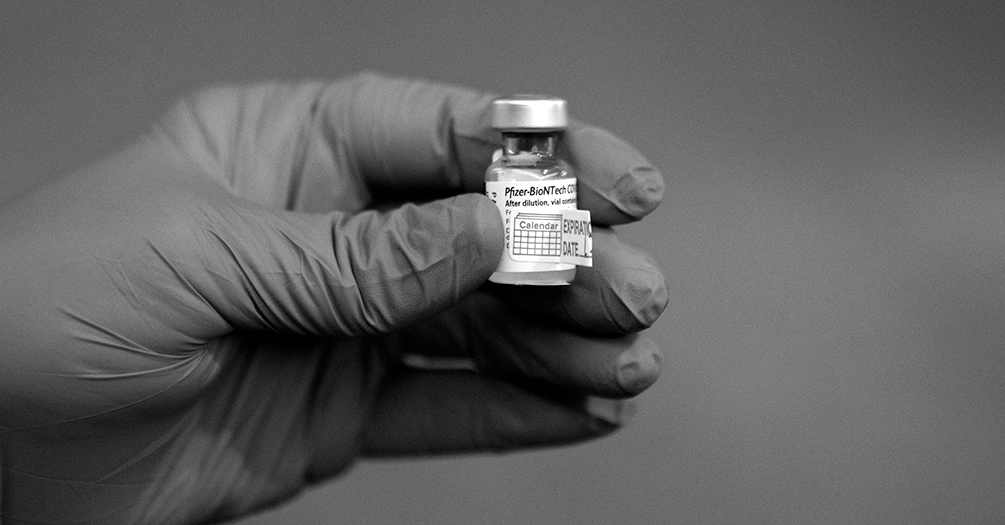Screening for Social Determinants of Health in Pediatric Settings

Phoebe Trout, Rebeccah Sokol, Julia Ammer, Layla S. Mohammed, Rachel Varisco, Sara F. Stein, and Alison L. Miller
Have you ever been asked by your doctor if you have enough food to get you through the week? What about if you are experiencing abuse? If you have stable and safe housing? If your heat works?
Asking these and similar questions is becoming part of standard practice in clinics across the country. Such questions are meant to help providers understand social need and address adversities that are known to precipitate a slurry of negative outcomes that can follow an individual over their lifetime. Early screening and intervention can help address adversities and mitigate their impact.1,2
Pediatric and family clinics across the country have begun screening children and their caregivers for social determinants of health (SDH). In recent years, numerous health care systems and many local and state governments have implemented SDH screens in their clinics and hospitals.3 These screeners can be an important first step in helping families access essential resources.
Long-term health outcomes associated with early adversity include increased rates of alcoholism, depression, heart disease, diabetes, and other chronic diseases.
The negative effects of childhood adversity extend to a variety of short- and long-term health and well-being outcomes. For example, children who have experienced adversity are more likely to experience developmental delays, a suppressed functioning of their immune and nervous systems, and behavioral and mental health issues.4 Long-term health outcomes associated with early adversity include increased rates of alcoholism, depression, heart disease, diabetes, and other chronic diseases.5 Furthermore, the negative social outcomes associated with early adversity often include low education attainment, unemployment, housing insecurity, financial insecurity, and mental health struggles.
The year is 2020, and our country and world look vastly different than they did just a year ago. We are experiencing the COVID-19 pandemic, unprecedented political turmoil and distrust, widespread social unrest in response to racism and police brutality, climate change, dire inequality and inequity, and an impending recession.
We bring up the dreary state of the world because at times like these social need and social adversity take the spotlight. This is a trying time for everyone. But as with any struggle, adversity and social burdens are not distributed equally.
The ability to cope and maintain health is largely dependent on the ability to access high-quality health resources.
The capacity for any family or individual to cope with these circumstances is closely correlated to their social determinants of health. Be it the loss of a family member to COVID-19, economic, racial, or educational stressors, the ability to find resources, maintain resiliency, and overcome these excruciatingly challenging times—in all cases the ability to cope and maintain health is largely dependent on the ability to access high-quality health resources. Access to health insurance and care, healthy food, education for children (including pandemic “learning pods”), unemployment benefits, moratoriums on evictions, and safe and harassment-free neighborhoods are all social factors that influence health.
In partnership with Michigan Medicine’s community pediatric clinics, the Child Health and Development Lab at the University of Michigan School of Public Health is conducting interviews with pediatric providers in Michigan and California. These interviews help us evaluate pediatric provider perspectives in relation to SDH screening and identify potential barriers to screening for SDH. The interviews are also providing insight into the ways these practitioners are integrating SDH knowledge into their care. Ultimately, we hope to investigate how SDH screening relates to the reception of these services by patients as well as to child health outcomes such as obesity.
There has never been a more pressing time to do this type of work. More families are in need of resources—food access, housing advocacy, child care and education, health and mental health care, unemployment benefits, and so on—than ever before. We anticipate that providers who feel they have a greater understanding of SDH as well as existing relationships with the systems that provide such resources will feel better equipped to address patient needs.
We have yet to see the impact COVID-19 has on children growing up during this strange time, but the insights we gather from these interviews will help us understand the role screening for SDH in pediatric and other child-serving settings might play in addressing the social needs of children and families. We think screening will become an important step in promoting child health and well-being by connecting families with the resources they need.
Notes
- Gottlieb, L., Hessler, D., Long, D., Amaya, A., and Adler, N. “A Randomized Trial on Screening for Social Determinants of Health: The iScreen Study.” Pediatrics 134/6 (December 2014):e1611-e1618.
- Garg, A., Toy, S., Tripodis, Y., Silverstein, M., and Freeman, E. (2015). “Addressing Social determinants of Health at Well Child Care Visits: A Cluster RCT.” Pediatrics 135/2 (February 2015):e296-e304.
- Garg, A., Cull, W., Olson, L., Boyd, A. F., Federico, S. G., Dreyer, B., and Racine, A.D. “Screening and Referral for Low-Income Families’ Social Determinants of Health by US Pediatricians.” Academic Pediatrics 19/8 (Nov-Dec 2019):875-883.
- Oh, D.L., Jerman, P., Silvério Marques, S. et al. “Systematic Review of Pediatric Health Outcomes Associated with Childhood Adversity.” BMC Pediatrics 18/83 (February 2018).
- Hughes K, Bellis MA, Hardcastle KA, Sethi D, Butchart A, Mikton C, Jones L, Dunne MP. “The Effect of Multiple Adverse Childhood Experiences on Health: A Systematic Review and Meta-Analysis.” Lancet Public Health 2/8 (August 2017):e356-366.
CORC Interview Themes

Funding for this work was from the Childhood Obesity Research Core, P30 DK08950.
About the Authors
Phoebe Trout is a dual degree student at the University of Michigan, pursuing an MPH in Health Behavior and Health Education at the School of Public Health and an MPP at the Gerald R. Ford School of Public Policy. She is a graduate research assistant in the Child Health and Development Lab.
Rebeccah Sokol, PhD, is assistant professor of Social Work at Wayne State University. She completed a postdoctoral fellowship at the School of Public Health in 2020.
Julia Ammer is an undergraduate student at Northwestern University studying social policy. She began working as a research assistant in the Child Health and Development Lab in March 2020.
Layla S. Mohammed, MB ChB, is clinical assistant professor of Pediatrics. She is a primary care pediatrician with a special interest in developmental screening and children with special health care needs. She is involved in community projects related to children with developmental needs, particularly for low income families.
Rachel Varisco, MPH ’20, is the Health and Nutrition Coordinator for Pacific Clinics in Pasadena, CA. She worked with the Child Health and Development Lab from 2019-2020, when she completed her MPH at the School of Public Health.
Sara F. Stein, MS, MSW, LMSW, is a doctoral candidate in the Joint PhD Program in Social Work and Social Science (Clinical Psychology) at the University of Michigan. Sara is also a practicing licenced clinical social worker in the community.
Alison L. Miller, PhD, is associate professor of Health Behavior and Health Education at the University of Michigan School of Public Health and directs the Child Health and Development Lab.
- Interested in public health? Learn more today.
- Read more articles by students, faculty, staff, and alums of Michigan Public Health.
- Support research at Michigan Public Health.
Read More Stories from the Spring 2021 Issue of Findings



